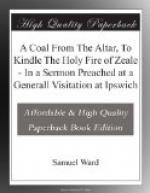[Sidenote: 2. From his spirituall nature.]
Consider and reason thus with thy selfe (O man) canst thou brooke a sluggard in thy worke, if thou bee of any spirit thy selfe? is not a slothfull messenger as vinegar to thy teeth, and as smoake to thine eyes? Hast thou any sharpnesse of wit, is not dulnesse tedious unto thee? And shall hee that is all spirit (for whom the Angels are slow and colde enough) take pleasure in thy drowzie and heavie service? Doe men choose the forwardest Deere in the heard, and the liveliest Colt in the drove? and is the backwardest man fittest for God? Is not all his delight in the quickest and cheerefullest givers and servitors? Even to Judas he saith, That thou doest, doe quickely; so odious is dulnesse unto him: what else mooved him to ordaine, that the necke of the consecrated Asse should bee broken, rather then offered up in sacrifice; doth God hate the Asse? Or is it not for the sake of the quality of the creature; which hath ever among the Heathens beene an Hieroglyphick of heavinesse and tardity?
[Sidenote: 3. Effects of zeale. Revel. 12.]
[Sidenote: Opus operatum.]
Thirdly, this zeale is so gracious a favorite with God, that it graces with him all the rest of his graces. Prayer if it bee fervent, prevaileth much: the zealous witnesses had power to shut and open heaven: by this, Israel wrastled with God, overcame, and was called a Prince with God: this strengthned the heart of Moses (as Aaron and Hur supported his hands) till the Lord sayd, Let me alone: this made Cornelius his prayer to come into heaven; whither our colde sutes can no more ascend, then vapours from the Still, unlesse there bee fire under it: Repentance, a needefull and primary grace, which the Baptist so urged: but then wee must bee zealous and repent (as my text joynes them) or else no repentance pleaseth God; nor are there fruits worthy repentance. Almes and good deeds are sacrifices pleasing to God; but without zeale, the widowes mites




